| Srl | Item |
| 1 |
ID:
141758
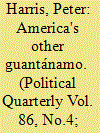

|
|
|
|
|
| Summary/Abstract |
The British Indian Ocean Territory (BIOT) is one of Britain's most controversial Overseas Territories. Its indigenous people, the Chagossians, were exiled from their homes in the 1960s and 1970s so that BIOT could play host to a US military base on the island of Diego Garcia. Meanwhile, Diego Garcia has been tarnished by revelations regarding its role in the CIA's ‘extraordinary rendition’ programme and by allegations of torture. And earlier this year, an international tribunal ruled that the UK government had violated international law by pushing through a Marine Protected Area to cover the territory over and above the protestations of neighbouring states. In this article, I argue that allowing the resettlement of BIOT by the Chagossians would go a long way towards improving the way that the territory has been governed for the past five decades.
|
|
|
|
|
|
|
|
|
|
|
|
|
|
|
|
| 2 |
ID:
141763


|
|
|
|
|
| Summary/Abstract |
This article constitutes a pointed theoretical intervention in the debate opposing Richards and Smith to Flinders on the question of citizen disengagement. Its main contention is that Richards and Smith offer a straw-man argument against Flinders by identifying him with positions he does not hold. It thus shows that Richards and Smith falsely identify Flinders with the following positions: (a) there is no need for a major overhaul in the UK's existing democratic and governance arrangements; (b) the problem of citizen disengagement is caused by the public's insatiable demand for democratic participation; and (c) the problem with British politics is that there is too much democracy and accountability. Finally, the article closes by identifying points of genuine tension between the Richards/Smith position and that defended by Flinders.
|
|
|
|
|
|
|
|
|
|
|
|
|
|
|
|
| 3 |
ID:
141756
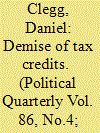

|
|
|
|
|
| Summary/Abstract |
Introduced in the late 1990s, tax credits grew under successive Labour governments to become a cornerstone of UK social policy. Distinguished from traditional welfare policies by their target group and their mode of administration, and with goals that appeared capable of commanding support across the ideological spectrum, tax credits until recently seemed to hold the key to tackling poverty in a politically popular manner. But since 2010 the tax credit system has been systematically dismantled, initially qualitatively and latterly also quantitatively. This paper discusses the multiple factors that help to explain the rapid fall from grace in the UK of this liberal approach to supporting the incomes of poor working households.
|
|
|
|
|
|
|
|
|
|
|
|
|
|
|
|
| 4 |
ID:
141757
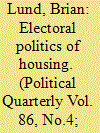

|
|
|
|
|
| Summary/Abstract |
This article surveys the territorial politics of housing policy with particular reference to the Conservative Party. It examines the how attempts to establish a new planning framework under the previous Coalition government came unstuck and sets out the implications of the planning impasse for home ownership and ‘generation rent’. The territorial and tenure dimensions of the 2015 General Election are considered and possible future Conservative conflicts over land release are explored.
|
|
|
|
|
|
|
|
|
|
|
|
|
|
|
|
| 5 |
ID:
141759
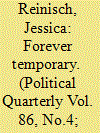

|
|
|
|
|
| Summary/Abstract |
This article examines two recent refugee crises in Calais: the debate around the Sangatte refugee camp, which was resolved in 2002, and the ongoing problems in Calais, which have been escalating since autumn 2014. It asks: why are these events repeating? What, if anything, has changed between 2002 and now? It points to a number of new developments since 2002, such as growing numbers of migrants worldwide, and a changing European political and legal landscape. But it also argues that a number of the same factors that led to the Sangatte crisis are still shaping events and responses in Calais today. They concern the persistent shortcomings of European states’ immigration controls, the failures to reach Europe-wide and international agreements on migration, and the inadequacies of international bodies such as the UNHCR and the 1951 Refugee Convention which it upholds.
|
|
|
|
|
|
|
|
|
|
|
|
|
|
|
|
| 6 |
ID:
141764
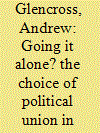

|
|
|
|
|
| Summary/Abstract |
This article explores the inter-related debates over Britain's relationship with the EU and that over the future of the UK. It argues that euroscepticism and Scottish independence are based on exceptionalist identities that now revolve around economic policy. Elite euroscepticism cleaves to a neoliberal vision of minimalist regulation, while advocates of Scottish independence claim Westminster's austerity policies make the British Union incompatible with social democracy. However, this presentation of the choice facing British voters ignores the serious contradictions that overhauling the current order entails. Both forms of exceptionalism fail to recognize the significant limitations of self-government outside and within the EU. If Conservatives can contain their neoliberal flirtation with EU withdrawal they are very well placed to prosper electorally. The dilemma of which union(s) to choose might thus constitute the prelude to the entrenchment of the economic and political order that gave rise to such contestation in the first place.
|
|
|
|
|
|
|
|
|
|
|
|
|
|
|
|
| 7 |
ID:
141753
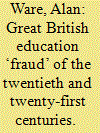

|
|
|
|
|
| Summary/Abstract |
The role played by educational credentials in British labour market recruitment changed radically during the mid-twentieth century. Having higher or better credentials than others became a key determinant in selection for society's best-paid jobs. The resulting race for them has had perverse effects. A large minority of graduates earn no more than non-graduates or are in jobs for which they are ‘overeducated’. In various ways, the incentive to ‘stay ahead’ has prompted large expenditures by families to improve the qualifications a child obtains at school, while there is also now huge demand for postgraduate qualifications. Not only is there resulting social waste but also social injustice; while education was understood previously as a means of breaking down barriers to social mobility, it now has the opposite effect. This article explores the causes of these developments and outlines briefly how a new centre-left agenda for education might be constructed.
|
|
|
|
|
|
|
|
|
|
|
|
|
|
|
|
| 8 |
ID:
141765
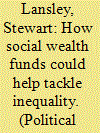

|
|
|
|
|
| Summary/Abstract |
This article examines the potential to tackle the roots of inequality by the introduction of one or more social wealth funds. Such funds would aim to capture some of the financial gains from the private ownership of capital—a principal driver of inequality—and use the proceeds for wider community benefit, such as investment in social infrastructure. In recent decades a number of countries have introduced a variant on such funds, mostly taking the form of state-owned sovereign wealth funds resourced through the exploitation of oil, and used for a diversity of economic purposes. In contrast, the UK has failed to take the opportunity to create such funds by, for example, reinvesting the revenue from the sales of public assets. So would it be possible to build one or more such collectively owned funds in the UK, and if so, how should they be financed? As well as funding social investment and anti-inequality programmes, could such a scheme also help finance a regular Citizen's Dividend payment or a Citizen's Income scheme?
|
|
|
|
|
|
|
|
|
|
|
|
|
|
|
|
| 9 |
ID:
141762


|
|
|
|
|
| Summary/Abstract |
This article contributes to the debate in this journal about the state of British democracy. I criticise the tendency to use a ‘demand–supply’ dichotomy in interpreting the strong distrust experienced by institutions and politicians, and especially the idea that all the blame for current problems is to be attributed to the inadequateness of the British political tradition (BPT). By referring to international data on democracy and to recent British trends in both public attitudes and institutional innovations, a more nuanced picture on the state of democracy emerges. I argue that the BPT is not incompatible with incremental changes that have already introduced innovations in the way politics works in Britain today, and that the task of empowering citizens is one of the most delicate aspects in this process of innovation.
|
|
|
|
|
|
|
|
|
|
|
|
|
|
|
|
| 10 |
ID:
141754


|
|
|
| 11 |
ID:
141761
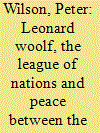

|
|
|
|
|
| Summary/Abstract |
Co-founding The Political Quarterly was one among many of Leonard Woolf's achievements during a long career as a progressive political thinker and publicist, particularly in the field of international affairs. To mark the centenary of the publication of International Government, his most innovative and influential work on the subject, this article seeks to assess Woolf's contribution. It examines the Fabian background to Woolf's work, his support for and approach to the League of Nations and his commitment to collective security as an approach to peace. Through a broader understanding of the League it argues that certain failings in the area of collective security, however profound, should not be permitted to blight an otherwise impressive intellectual legacy.
|
|
|
|
|
|
|
|
|
|
|
|
|
|
|
|
| 12 |
ID:
141751


|
|
|
| 13 |
ID:
141760
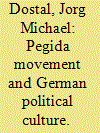

|
|
|
|
|
| Summary/Abstract |
This article outlines the rise and fall of the ‘Patriotic Europeans against the Islamisation of the West’ (Pegida), a right-wing populist street movement that originated in the city of Dresden in October 2014 and peaked in January 2015. The Pegida movement combined fear of ‘Islamisation’ with general criticism of Germany's political class and the mainstream media. This ambivalent and largely undefined political profile proved its strength in mobilising a significant minority of right-wing citizens in the local context of Dresden and the federal state of Saxony, but generally failed to spill over to other parts of Germany. The social profile of the Pegida movement, which included ‘ordinary citizens’ with centre-right to far-right attitudes, points to significant overlap between general disenchantment of the political centre ground in Germany with the political system, as outlined in recent sociological research, and the ability of a largely leaderless populism to mobilise in the streets.
|
|
|
|
|
|
|
|
|
|
|
|
|
|
|
|
| 14 |
ID:
141752


|
|
|
| 15 |
ID:
141750


|
|
|
| 16 |
ID:
141755
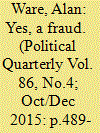

|
|
|